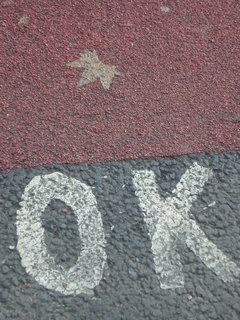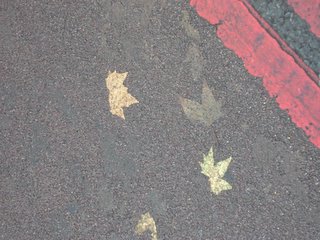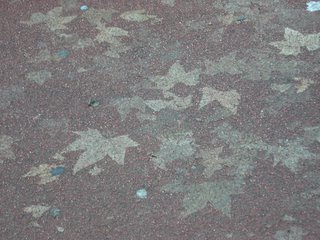
Have you noticed the way autumn leaves rub off on the asphalt? It's usually the plane leaves, on coloured patches of the road (cycle paths, pedestrian crossings). Leaves turn to stains, flat and almost abstract. It's like cycling on wallpaper.
Last year, when autumn leaves became a household necessity (but not a commodity) I started noticing them more and thinking about the fall. The austerity and beauty of the whole thing leaves me speechless. They grow, they fall, they disappear without a trace, every year. They crumble into thin air. Like the phoenix. And unlike us.

Traces Left Behind
Earlier this year I went up to Scotland for the G8. The night before the opening of the summit we hiked through the hills, camping above a water reservoir. In the morning we discovered on the other side of the reservoir some ancient ruins; they must have been there long before the reservoir. Now they were little more than piles of stones, and some traces of walls.
We kept going; when we hit a gravel road, the first modern human thing we came upon was a jeep telling us not to go off the road, this being private land owned by Highlands Water company. Not long after, we came upon two cabins of chemical toilets.
I don't know much about chemical toilets. But I did a bit of reading and as far as I understand the idea is to treat toxic body waste - ie shit - not by allowing it to break down, but rather by disinfecting it with chemicals, such as the carcinogenic formaldehyde, which actually preserves the disinfected pooh. As one person commented on a discussion forum:
Don't use it. There's no reason to embalm your effluvia for future
generations. Formaldehyde stops aerobic and anaerobic decomposition in
septic disposal systems and bodies of water and is a health hazard.
This stuff is vile. True, uncareful treatment of excrement can spread diseases. But turning it into a poisonous soup doesn't sound quite the right solution. These chemical toilets are our legacy: the plastic altars that our civilization is erecting in the hills of Scotland. They are perhaps less robust than the stone ruins that are now crumbling into the valley, but they will remain for much longer.
Above our heads the helicopters were buzzing, bringing the guests to Gleneagles.




No comments:
Post a Comment